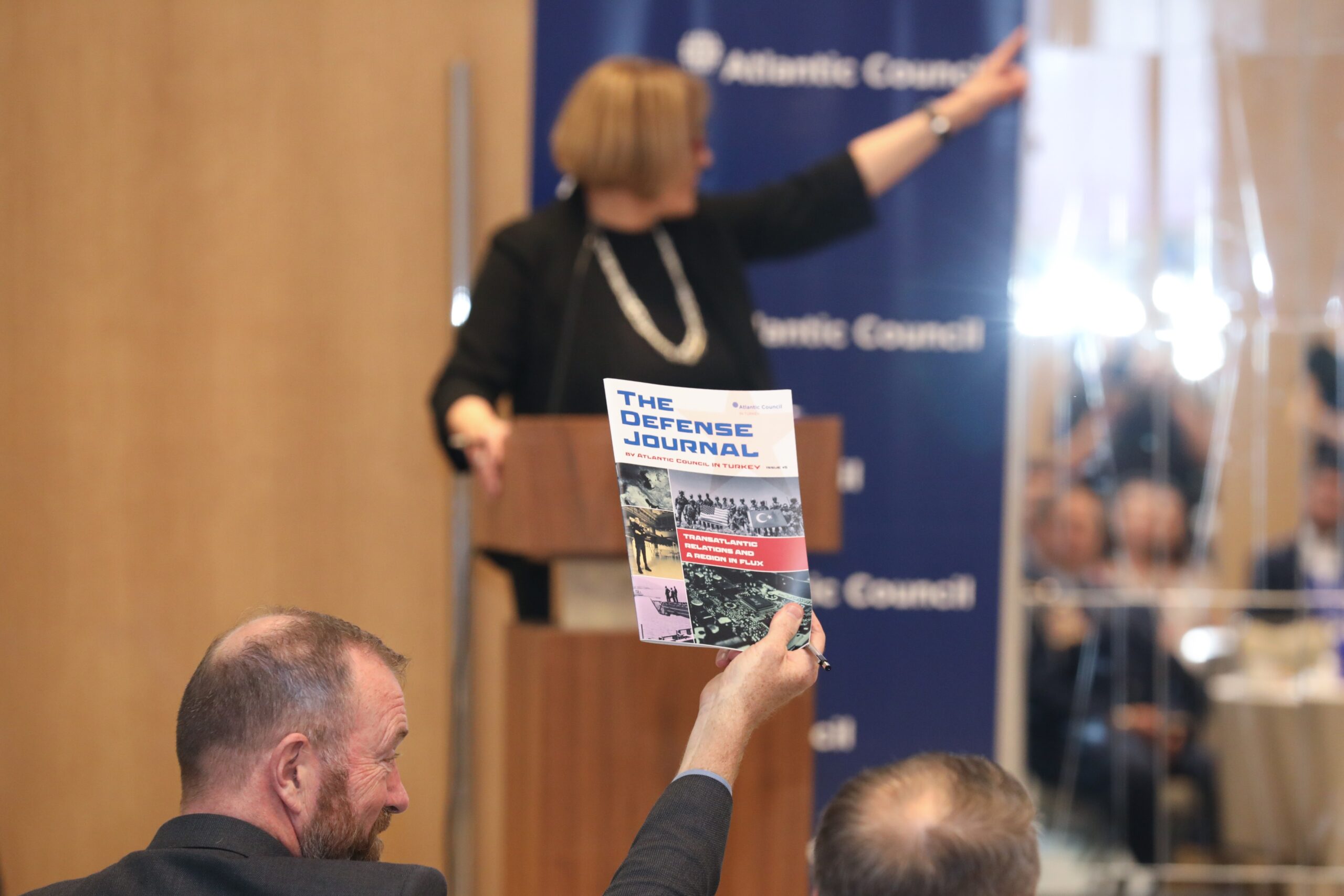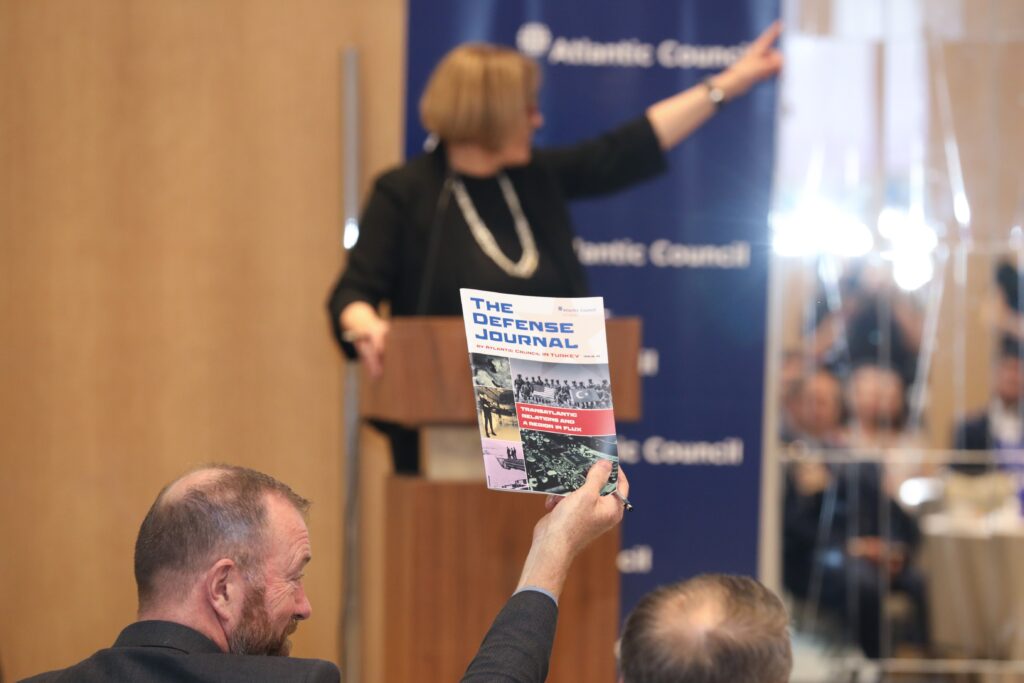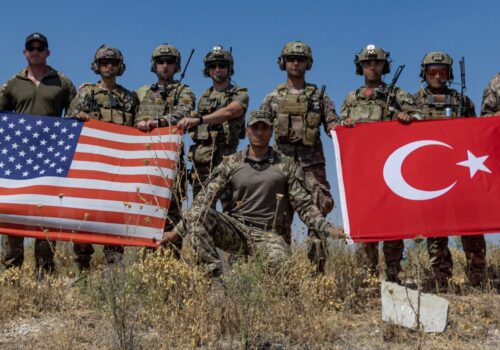Transatlantic experts highlight the importance of growing US-Turkish defense ties
From Russia’s war on Ukraine to the Israel-Hamas conflict and heightened tensions across the Middle East, Turkey’s strategic role in promoting regional stability and security has become especially salient. As crises persist across the region, now is the time to increase cooperation and alignment of mutual interests between NATO allies Turkey and the United States.
On July 23 in Istanbul, on the sidelines of the International Defense Industry Fair, the Atlantic Council Turkey Program organized an event to discuss transatlantic defense relations and strategic cooperation in a region in flux, gathering business leaders, diplomats, and experts.
The event also launched the fifth issue of the Defense Journal by the Atlantic Council Turkey Program, a publication covering the latest developments in the bilateral defense relationship and the defense sector, featuring analysis on the full spectrum of defense and security issues affecting the United States, Turkey, and the Middle East.
Turkey and the United States have entered an era of renewed bilateral relations, with Ankara and Washington showing increasing will at the highest level to enhance dialogue and cooperation. Both the Middle East’s ongoing conflicts and its emerging opportunities, such as the rise of the new government in Syria, have underscored Turkey’s strategic position as a crucial partner for the United States in this period of change. However, while there is positive momentum in bilateral dialogue, certain points of disagreement persist, such as the US partnership with the People’s Defense Units (YPG) in Syria, sanctions under the Countering America’s Adversaries Through Sanctions Act (CAATSA), and diverging perspectives on Israel’s foreign policy.
Defense cooperation is a central pillar of the US-Turkey bilateral relationship. As the second-largest NATO army, Turkey has recently shifted from being a major US defense tech importer to a domestic defense tech manufacturer and rising exporter. Turkish drones and unmanned aerial vehicle technology have proved successful on the battlefield from the South Caucasus to Libya to Ukraine.
Turkey and the United States see strong potential and shared interest in deepening their defense cooperation. A long-stalled deal for F-16 fighter jet sales to Turkey is progressing, with growing optimism in both capitals that it will soon be finalized. Both sides are signaling readiness to address and overcome the CAATSA sanctions the United States imposed on Turkey following its purchase of the Russian S-400 system, which have constrained US-Turkey defense cooperation for several years. Turkey’s readmission to the F-35 program has also been raised as a topic for discussion.
Below are highlights from the Turkey Program’s Defense Journal launch event, which addressed the importance of US-Turkey defense relations and US-Turkey strategic cooperation in the region.
- Defne Arslan, senior director of the Turkey Program and AC in Turkey at the Atlantic Council: “The region stands at an inflection point. This historic moment calls for increasing cooperation and alignment of mutual interests between NATO allies; Turkey and the United States,” said Arslan in her welcoming remarks.
- General James L. Jones, executive chairman emeritus at the Atlantic Council, former US national security advisor, and former supreme allied commander Europe: Jones noted: “Turkey’s defense capabilities and strategic location make it a critically important ally for the United States in tackling regional security challenges.”
- Michael Goldman, chargé d’affaires at the US embassy in Turkey: Goldman spoke about the United States and Turkey’s ever-evolving partnership, arguing that their cooperation is important for addressing regional challenges. He also noted several qualities that provide Turkey’s strategic importance for NATO: “When we talk about the region in flux, Turkey is the center of it…This country and our relationship have three things: Turkey’s geography, its mass, and its innovative capacity.”
- Rich Outzen, co-managing editor of the Defense Journal and a nonresident senior fellow at the Atlantic Council’s Turkey Program: Outzen said that there was an alignment in Turkish President Recep Tayyip Erdoğan and US President Donald Trump’s approach to Russia, arguing that both leaders prioritize engaging Moscow through strength while keeping the door open to negotiations to end its war against Ukraine. Outzen highlighted that both Turkey and the United States have substantial battlefield experience, especially in evolving methods of war. Outzen also explained the intent behind the Defense Journal: “Both the US and Turkey suffer from information pollution about the relationship. There are some ideas that paint us as enemies of one another rather than allies of long standing. The Defense Journal is a response to that.”
- Can Kasapoğlu, co-managing editor of the Defense Journal by the Atlantic Council Turkey Program: “With the Defense Journal, we want Turkish and American strategic communities to be able to communicate, agree and disagree, like two NATO allies,” Kasapoğlu said. He added that the Defense Journal project is important for keeping the momentum for further cooperation between the US and Turkish defense communities.
- Ambassador Ömer Önhon, former Turkish ambassador to Syria: “Turkish-American cooperation is essential for lasting stability in Syria; but we have to have a common ground,” Önhon said. Önhon underlined that the US-Turkey partnership was indispensable for ensuring stability in Syria. However, while the main goals of the two allies are aligned, he said, there are a few ongoing issues such as US support to the YPG, which he said should be addressed to further improve joint efforts for Syria’s reconstruction. Önhon also shared his key takeaways from his recent trip to Syria, where he observed that unlike in the case of Iraq, the state structures from the era of Bashar al-Assad’s regime were not eradicated by the new government. He argued that this gives Syria’s new leadership a good foundation to slowly and deliberately reshape governance and develop better practices. While acknowledging that Syria’s reconstruction would be a slow process and a long-term challenge, Önhon argued that there is unexplored potential for increasing transatlantic engagement with the region while also addressing Turkey’s regional strategy and potential future role in Syria.
- General Tod D. Wolters, distinguished fellow at the Atlantic Council’s Scowcroft Center for Strategy and Security Atlantic Council and former supreme allied commander Europe: To conclude the event, Wolters reiterated the importance of the US-Turkey defense partnership for tackling regional security challenges. Wolters highlighted the qualities of the Turkish defense sector that make it strategically important for the United States. “One of the military and government attributes of Turkey is its tremendous degree of readiness,” said Wolters. “It has a lot to do with resilience and responsiveness,” he said, crediting Turkey’s readiness posture for its contribution to regional stability.
Photos from the event
Alp Ozen is a program assistant at the Atlantic Council Turkey Program.
Zeynep Egeli is project assistant at the Atlantic Council Turkey Program.





